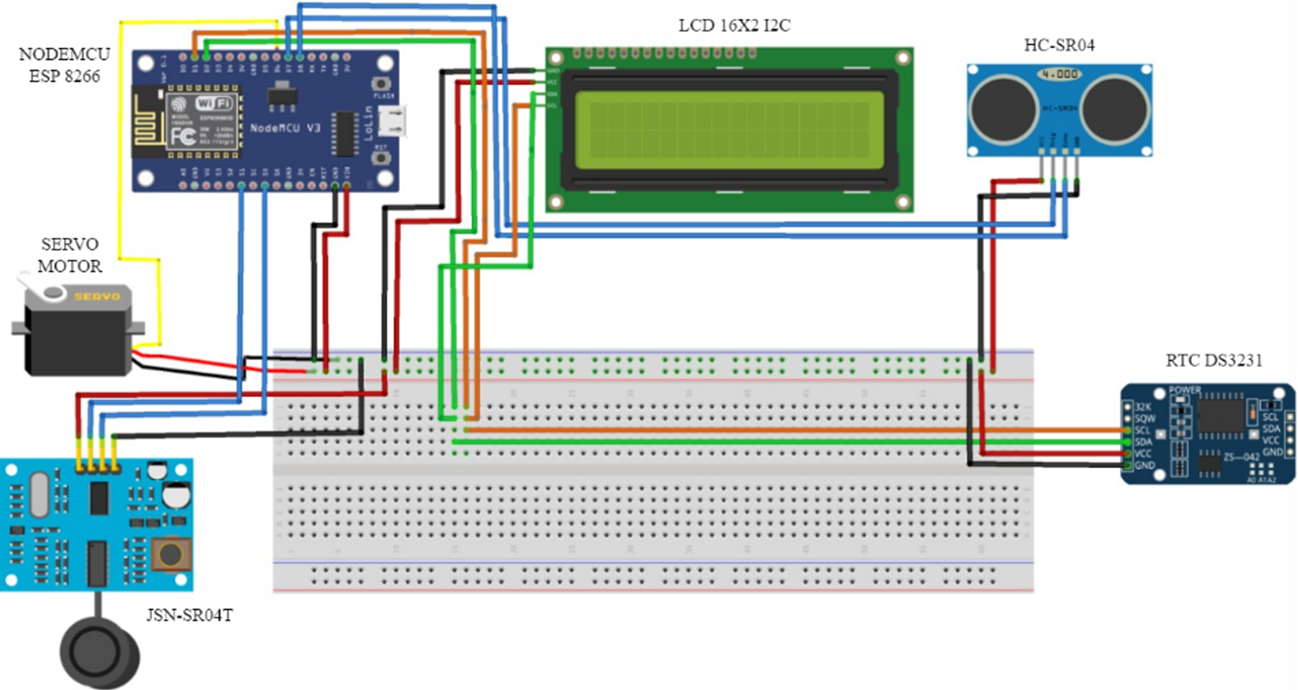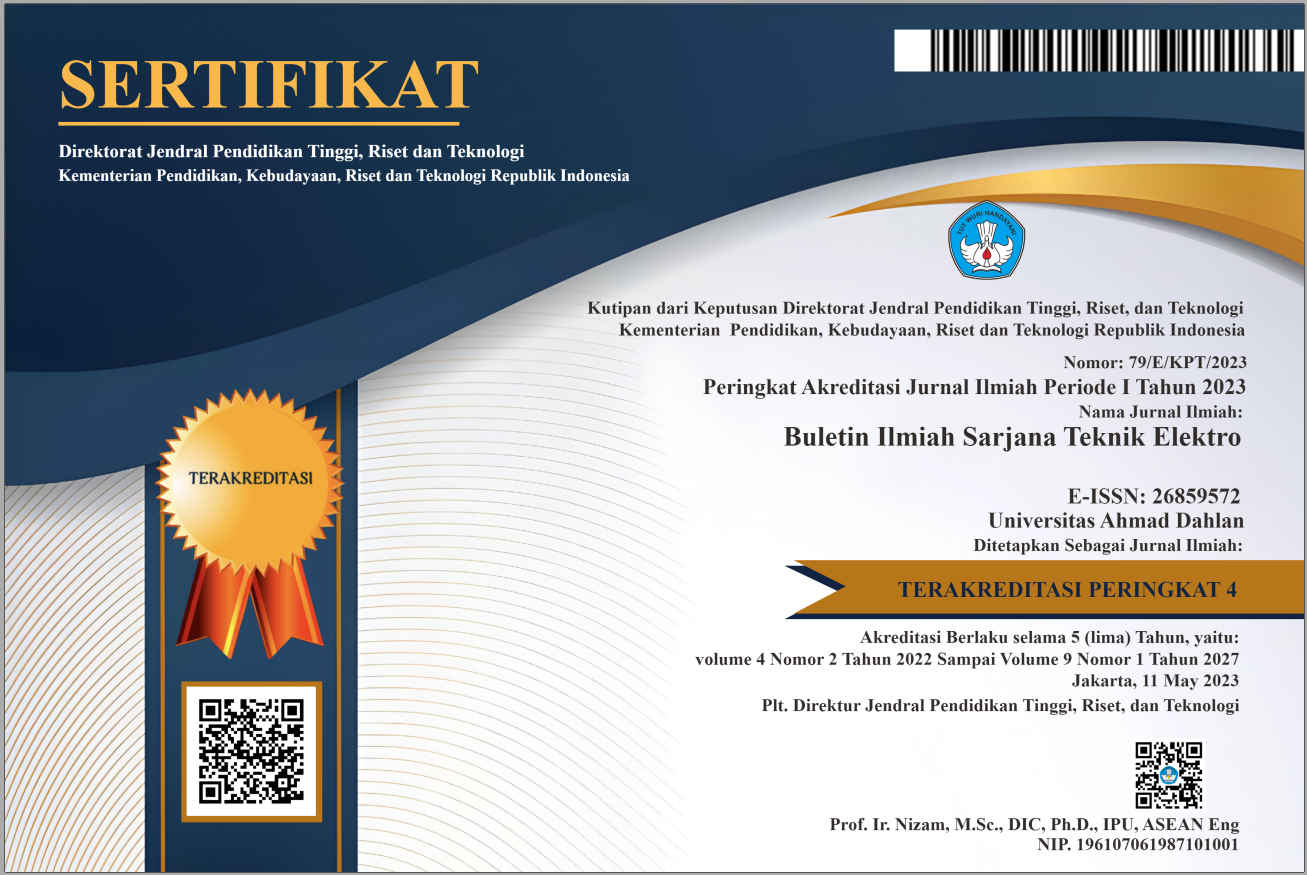Automatic Fish Feeder and Telegram Based Aquarium Water Level Monitoring
DOI:
https://doi.org/10.12928/biste.v5i1.7575Keywords:
Automatic Fish Feed, Esp8266, TelegramAbstract
An important factor in maintaining fish in an aquarium is the timeliness of feeding fish. Most fish keepers are worried about the aquarium's feeding and water conditions, which must be done every day. Therefore, an automatic fish feeding tool and telegram-based monitoring of aquarium water levels were made to make it easier for fish keepers and aquarium owners to provide and monitor fish feed automatically according to a predetermined schedule. Monitoring the remaining feed and water level in the aquarium is done via Telegram. The components used in this tool are Esp 8266 as a microcontroller, RTC as a timer for scheduling fish feed, Ultrasonic as a detector for remaining fish feed, JSN-SR04T as a water level detector, LCD to display time and date as well as notifications and a servo motor functions to open and close the fish feed. The conclusion from the results obtained from this device is that the device works well and helps the aquarium owner to monitor and feed efficiently, despite some challenges such as delay due to poor internet connection.
References
T. E. Suherman, M. H. Widianto and Z. Athalia, “Internet of Things System for Freshwater Fish Aquarium Monitoring and Automation Using Iterative Waterfall,” 2022 4th International Conference on Cybernetics and Intelligent System (ICORIS), pp. 1-6, 2022, https://doi.org/10.1109/ICORIS56080.2022.10031310.
R. Mahkeswaran and A. K. Ng, “Smart and Sustainable Home Aquaponics System with Feature-Rich Internet of Things Mobile Application,” in 2020 6th International Conference on Control, Automation and Robotics, ICCAR 2020, pp. 607–611, 2020, https://doi.org/10.1109/ICCAR49639.2020.9108041.
M. J. M. Autos et al., “Automated aquaponics system and water quality monitoring with SMS notification for tilapia industry,” in IEEE Region 10 Annual International Conference, Proceedings (TENCON), pp. 367–372, 2020, https://doi.org/10.1109/TENCON50793.2020.9293868.
R. Aisuwarya and E. F. Suhendra, “Development of Automatic Fish Feeding System based on Gasping Behavior,” in 2018 International Conference on Information Technology Systems and Innovation (ICITSI), pp. 470–473, 2018, https://doi.org/10.1109/ICITSI.2018.8696050.
H. Kuroki, H. Ikeoka and K. Isawa, “Development of simulator for efficient aquaculture of Sillago japonica using reinforcement learning,” in Proceedings of International Conference on Image Processing and Robotics, ICIPRoB 2020, pp. 1-4, 2020, https://doi.org/10.1109/ICIP48927.2020.9367369.
V. U. Tjhin and R. E. Riantini, “Intelligent Feeder Development Plan as Fish Feed Technology for Sustainable Integration and Delivery,” in 2021 3rd International Conference on Cybernetics and Intelligent System (ICORIS), pp. 1–5, 2021, https://doi.org/10.1109/ICORIS52787.2021.9649602.
N. H. Harani, A. S. Sadiah and A. Nurbasari, “Smart Fish Feeder Using Arduino Uno With Fuzzy Logic Controller,” 2019 5th International Conference on Computing Engineering and Design (ICCED), 2019, pp. 1-6, 2019, https://doi.org/10.1109/ICCED46541.2019.9161114.
W. -C. Hu, L. -B. Chen, B. -K. Huang and H. -M. Lin, “A Computer Vision-Based Intelligent Fish Feeding System Using Deep Learning Techniques for Aquaculture,” in IEEE Sensors Journal, vol. 22, no. 7, pp. 7185-7194, 2022, https://doi.org/10.1109/JSEN.2022.3151777.
J. John and M. P. R, “Automated Fish Feed Detection in IoT Based Aquaponics System,” in 2021 8th International Conference on Smart Computing and Communications (ICSCC), pp. 286–290, 2021, https://doi.org/10.1109/ICSCC51209.2021.9528186.
H. N. Binti Hasim, M. Ramalingam, F. Ernawan and Puviarasi R., “Developing fish feeder system using Raspberry Pi,” 2017 Third International Conference on Advances in Electrical, Electronics, Information, Communication and Bio-Informatics (AEEICB), pp. 246-250, 2017, https://doi.org/10.1109/AEEICB.2017.7972422.
A. Ilvonen, K. Bennett and A. Bennett, “Design and Testing of an Autonomous Cable Mounted Aquaculture Robot,” in OCEANS 2022, Hampton Roads, pp. 1–6, 2022, https://doi.org/10.1109/OCEANS47191.2022.9977112.
A. Abu-Khadrah, G. F. Issa, S. Aslam, M. Shahzad, K. Ateeq and M. Hussain, “IoT Based Smart Fish-Feeder and Monitoring System,” 2022 International Conference on Business Analytics for Technology and Security (ICBATS), pp. 1-4, 2022, https://doi.org/10.1109/ICBATS54253.2022.9759058.
W. Vernandhes, N. S. Salahuddin, A. Kowanda and S. P. Sari, “Smart aquaponic with monitoring and control system based on iot,” 2017 Second International Conference on Informatics and Computing (ICIC), pp. 1-6, 2017, https://doi.org/10.1109/IAC.2017.8280590.
Y. Saragai, T. Sato, H. Kuroki, H. Ikeoka and K. Isawa, “Study on Adapting the Auto Feeding System for Sillago Japonica to Actual Aquaculture Environment,” in 2022 2nd International Conference on Image Processing and Robotics (ICIPRob), pp. 1–6, 2022, https://doi.org/10.1109/ICIPRob54042.2022.9798738.
M. N. Mamatha and S. N. Namratha, “Design & implementation of indoor farming using automated aquaponics system,” 2017 IEEE International Conference on Smart Technologies and Management for Computing, Communication, Controls, Energy and Materials (ICSTM), pp. 396-401, 2017, https://doi.org/10.1109/ICSTM.2017.8089192.
R. Barosa, S. I. S. Hassen and L. Nagowah, “Smart Aquaponics with Disease Detection,” 2019 Conference on Next Generation Computing Applications (NextComp), pp. 1-6, 2019, https://doi.org/10.1109/NEXTCOMP.2019.8883437.
L. -B. Chen, Y. -H. Liu, X. -R. Huang, W. -H. Chen and W. -C. Wang, “Design and Implementation of a Smart Seawater Aquarium System Based on Artificial Intelligence of Things Technology,” in IEEE Sensors Journal, vol. 22, no. 20, pp. 19908-19918, 2022, https://doi.org/10.1109/JSEN.2022.3200958.
R. S. Paculanan, R. S. Cheng, S. C. Ambat and R. T. Adao, “A Fish Feeder Mechanism with Timer/GSM based,” in 2021 IEEE 13th International Conference on Humanoid, Nanotechnology, Information Technology, Communication and Control, Environment, and Management (HNICEM), pp. 1–6, 2021, https://doi.org/10.1109/HNICEM54116.2021.9732014.
J. Dharanidharan and R. Puviarasi, “Simulation of Automatic Food Feeding System for Pet Animals,” 2018 Fourth International Conference on Advances in Electrical, Electronics, Information, Communication and Bio-Informatics (AEEICB), pp. 1-3, 2018, https://doi.org/10.1109/AEEICB.2018.8480849.
M. M. Elsokah and M. Sakah, “Next Generation of Smart Aquaponics with Internet of Things Solutions,” 2019 19th International Conference on Sciences and Techniques of Automatic Control and Computer Engineering (STA), pp. 106-111, 2019, https://doi.org/10.1109/STA.2019.8717280.
A. Akhriana, I. Intan, N. Tamsir, N. Nirwana, R. W. Rahmi and R. Rahmadani, “Microcontroller Application in Feeding Fish Using an Android Mobile,” in 2021 3rd International Conference on Cybernetics and Intelligent System (ICORIS), pp. 1–6, 2021, https://doi.org/10.1109/ICORIS52787.2021.9649453.
P. C. Menon, “IoT enabled Aquaponics with wireless sensor smart monitoring,” in Proceedings of the 4th International Conference on IoT in Social, Mobile, Analytics and Cloud, ISMAC 2020, pp. 171–176, 2020, https://doi.org/10.1109/I-SMAC49090.2020.9243368.
K. Jadhav, G. Vaidya, A. Mali, V. Bankar, M. Mhetre and J. Gaikwad, “IOT based Automated Fish Feeder,” in 2020 International Conference on Industry 4.0 Technology, I4Tech 2020, pp. 90–93, 2020, https://doi.org/10.1109/I4Tech48345.2020.9102682.
Y. Atoum, S. Srivastava and X. Liu, “Automatic feeding control for dense aquaculture fish tanks,” IEEE Signal Processing Letters, vol. 22, no. 8, pp. 1089–1093, 2015, https://doi.org/10.1109/LSP.2014.2385794.
J. C. C. Egargue, F. A. Pacaigue, R. G. F. Galicia and E. G. V. Magwili, “Development of an Automated Aquaponics System with Hybrid Smart Switching Power Supply,” 2020 IEEE REGION 10 CONFERENCE (TENCON), pp. 544-549, 2020, https://doi.org/10.1109/TENCON50793.2020.9293853.
A. Z. Mae H. Ambrosio et al., “Implementation of a Closed Loop Control System for the Automation of an Aquaponic System for Urban Setting,” 2019 IEEE 11th International Conference on Humanoid, Nanotechnology, Information Technology, Communication and Control, Environment, and Management (HNICEM), pp. 1-5, 2019, https://doi.org/10.1109/HNICEM48295.2019.9072729.
L. K. S. Tolentino et al., “Development of an IoT-based Aquaponics Monitoring and Correction System with Temperature-Controlled Greenhouse,” 2019 International SoC Design Conference (ISOCC), pp. 261-262, 2019, https://doi.org/10.1109/ISOCC47750.2019.9027722.
R. D. Clemente, “Development of On-Line Hatchery Monitoring and Feeding Management System for Nile Tilapia,” 2019 IEEE 11th International Conference on Humanoid, Nanotechnology, Information Technology, Communication and Control, Environment, and Management ( HNICEM ), pp. 1-4, 2019, https://doi.org/10.1109/HNICEM48295.2019.9072727.
S. Sansri, W. -Y. Hwang and T. Srikhumpa, “Design and Implementaion of Smart Small Aquaponics System,” 2019 Twelfth International Conference on Ubi-Media Computing (Ubi-Media), pp. 323-327, 2019, https://doi.org/10.1109/Ubi-Media.2019.00071.
I. Sulistiyowati and M. I. Muhyiddin, “Disinfectant Spraying Robot to Prevent the Transmission of the Covid-19 Virus Based on the Internet of Things (IoT),” Journal of Electrical Technology UMY (JET-UMY), vol. 5, no. 2, 2021, https://doi.org/10.18196/jet.v5i2.12363.

Published
How to Cite
Issue
Section
License
Copyright (c) 2023 Bagas Dewantara, Indah Sulistiyowati, Jamaaluddin Jamaaluddin

This work is licensed under a Creative Commons Attribution-ShareAlike 4.0 International License.
Authors who publish with this journal agree to the following terms:
- Authors retain copyright and grant the journal right of first publication with the work simultaneously licensed under a Creative Commons Attribution License that allows others to share the work with an acknowledgment of the work's authorship and initial publication in this journal.
- Authors are able to enter into separate, additional contractual arrangements for the non-exclusive distribution of the journal's published version of the work (e.g., post it to an institutional repository or publish it in a book), with an acknowledgment of its initial publication in this journal.
- Authors are permitted and encouraged to post their work online (e.g., in institutional repositories or on their website) prior to and during the submission process, as it can lead to productive exchanges, as well as earlier and greater citation of published work (See The Effect of Open Access).
This journal is licensed under a Creative Commons Attribution-ShareAlike 4.0 International License.


